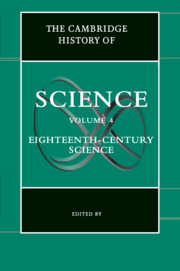Book contents
- Frontmatter
- 1 Introduction
- Part I Science and Society
- 2 The Legacy of the “Scientific Revolution”: Science and the Enlightenment
- 3 Science, the Universities, and other Public Spaces: Teaching Science in Europe and the Americas
- 4 Scientific Institutions and the Organization of Science
- 5 Science and Government
- 6 Exploring Natural Knowledge: Science and the Popular
- 7 The Image of the Man of Science
- 8 The Philosopher’s Beard: Women and Gender in Science
- 9 The Pursuit of the Prosopography of Science
- Part II Disciplines
- Part III Special Themes
- Part IV Non-Western Traditions
- Part V Ramifications and Impacts
- Index
- References
9 - The Pursuit of the Prosopography of Science
from Part I - Science and Society
Published online by Cambridge University Press: 28 March 2008
- Frontmatter
- 1 Introduction
- Part I Science and Society
- 2 The Legacy of the “Scientific Revolution”: Science and the Enlightenment
- 3 Science, the Universities, and other Public Spaces: Teaching Science in Europe and the Americas
- 4 Scientific Institutions and the Organization of Science
- 5 Science and Government
- 6 Exploring Natural Knowledge: Science and the Popular
- 7 The Image of the Man of Science
- 8 The Philosopher’s Beard: Women and Gender in Science
- 9 The Pursuit of the Prosopography of Science
- Part II Disciplines
- Part III Special Themes
- Part IV Non-Western Traditions
- Part V Ramifications and Impacts
- Index
- References
Summary
The difference of natural talents in different men is, in reality, much less than we are aware of; and the very different genius which appears to distinguish men of different professions … is not upon many occasions so much the cause, as the effect of the division of labour. The difference between the most dissimilar characters, between a philosopher and a common street porter, for example, seems to arise not so much from nature, as from habit, custom, and education. … By nature a philosopher is not in genius and disposition half so different from a street porter, as a mastiff is from a greyhound
David Sabean remarked a few years ago that Anglo-American sociology faced a crisis, as it had based itself fundamentally on the structures of “social class” – a concept that has now given way nearly completely to the concept of “identity.” So many ask now about the historical identity or persona of the scientist but do not seem to want the prosopographer’s answer, for that answer has tended to be given in terms of social class and its related sociological notions, such as the division of labor in the scientific community: a Smithian political economy of knowledge. It is interesting, moreover, that, although a prosopography of the subjects or “heroes” of knowledge may be at once a rather ancient and a very modern pursuit, its true age, from which it traces its provenance, is the eighteenth century. Our prosopography is kith and kin with the liberal, materialistic, and positivistic social and political philosophy of the eighteenth century.
- Type
- Chapter
- Information
- The Cambridge History of Science , pp. 211 - 238Publisher: Cambridge University PressPrint publication year: 2003
References
- 3
- Cited by



